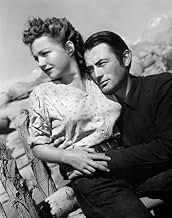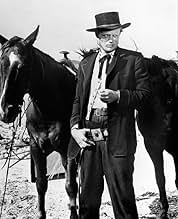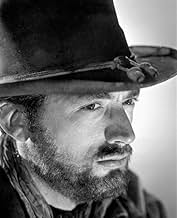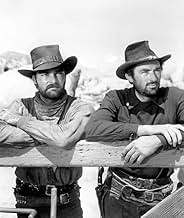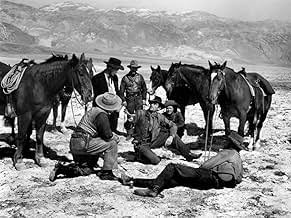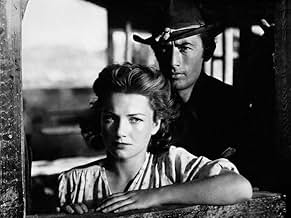IMDb RATING
7.4/10
6.3K
YOUR RATING
A pistol-packing tomboy and her grandfather discover a band of bank robbing bandits taking refuge in the neighboring ghost town.A pistol-packing tomboy and her grandfather discover a band of bank robbing bandits taking refuge in the neighboring ghost town.A pistol-packing tomboy and her grandfather discover a band of bank robbing bandits taking refuge in the neighboring ghost town.
- Director
- Writers
- Stars
- Awards
- 5 wins total
Harry Morgan
- Half Pint
- (as Henry Morgan)
Carlos Acosta
- Indian
- (uncredited)
Robert Adler
- Jed
- (uncredited)
Ray Beltram
- Indian
- (uncredited)
Harry Carter
- Cavalry Lieutenant
- (uncredited)
William Gould
- Banker
- (uncredited)
Eula Guy
- Woman Bank Customer
- (uncredited)
Paul Hurst
- Drunk
- (uncredited)
Victor Kilian
- Bartender
- (uncredited)
Norman Leavitt
- Bank Teller
- (uncredited)
Jay Silverheels
- Indian
- (uncredited)
- Director
- Writers
- All cast & crew
- Production, box office & more at IMDbPro
Featured reviews
This fine, moody Western was one of a handful of efforts – heralded, incidentally, by the same director’s THE OX-BOW INCIDENT (1943) – which elevated the form and led the genre into its most popular (and prolific) era.
Superbly shot in crisp black-and-white by Joe MacDonald, the film makes the most of its stark location (Death Valley) and terse plot – following a robbery, a band of outlaws eludes the pursuing posse by crossing the desert and finally hitting the titular ghost town (where the only inhabitants are a grizzled prospector and his tomboyish, gun-toting half-breed niece). The cast is headed by relatively new stars of the era – Gregory Peck (in only his second Western), Anne Baxter (she had just won a Supporting Oscar for THE RAZOR’S EDGE [1946]) and Richard Widmark (this was his first of many genre outings, having only debuted a year previously) – which allowed an agreeably fresh and remarkably mature outlook on familiar themes (a small group of people fighting the elements, and themselves over lust and greed).
Though Widmark is surprisingly off-screen for long periods of time (and, consequently, tends to be overshadowed by his co-stars), this still emerges as perhaps the most satisfying among the Westerns he appeared in. For the record, he would play variations on his role here in both GARDEN OF EVIL (1954) and THE LAW AND JAKE WADE (1958); incidentally, I have two more Westerns of his lined up for this week – the former among them (see below) – as part of my tribute to the recently deceased actor. With YELLOW SKY, Peck followed his roguish turn in DUEL IN THE SUN (1946): the character is eventually revealed to be an upstanding person – an intrinsic part of the star’s on-screen persona, which he could play against effectively but did so only occasionally – forced into a life of crime by circumstances. Naturally, the gang subsequently turns on Peck for not wanting to keep all the gold to themselves – and he holes himself up in Baxter and her grandfather’s house, under siege from his former companions! Baxter, then, has been raised in a tough environment where she can practically overcome any obstacle despite her young age and sex: in fact, even more than the outlaws’ intrusion on the life she knew and the property that was rightfully hers, Baxter fears her personal reaction to them (finding herself especially drawn to Peck, who arouses her dormant feminine instincts!).
The film was adapted by Lamar Trotti (who also produced) from a novel by W.R. Burnett, an author more usually associated with gangster/noir pictures and, in fact, as can also be seen from the colorful character names here – Stretch (Peck), Dude (Widmark), Lengthy (dastardly John Russell), Half-Pint (diminutive Henry Morgan), the youthful Bull-Run, the cheerfully heavy-set Walrus, etc. – the narrative could very easily be tailored to that particular milieu. That said, when it was actually remade – in 1967 under the title THE JACKALS, and atypically featuring horror icon Vincent Price in the role of the prospector (by the way, I’ll be watching this version presently since I came across it as a rental) – it retained the Western ambiance, albeit with a difference (which I’ll discuss in that film’s own review).
At the end of the day, I’d say that YELLOW SKY is pretty much essential fare (beautifully handled by the practiced and versatile Wellman – highlighted by a three-way shoot-out which audaciously takes place in a darkened bar-room, and off-screen to boot!). Even so, the film seems to me to be relatively undervalued within the pantheon of the genre itself: for instance, it doesn’t rate as highly as Peck’s three most prestigious Western titles (the afore-mentioned “super production” DUEL IN THE SUN – elaborate, garish but overpowering, the no less grandiose and star-studded THE BIG COUNTRY [1958], and the intimate but psychologically-dense THE GUNFIGHTER [1950] – of which a second viewing is truly in order!).
Superbly shot in crisp black-and-white by Joe MacDonald, the film makes the most of its stark location (Death Valley) and terse plot – following a robbery, a band of outlaws eludes the pursuing posse by crossing the desert and finally hitting the titular ghost town (where the only inhabitants are a grizzled prospector and his tomboyish, gun-toting half-breed niece). The cast is headed by relatively new stars of the era – Gregory Peck (in only his second Western), Anne Baxter (she had just won a Supporting Oscar for THE RAZOR’S EDGE [1946]) and Richard Widmark (this was his first of many genre outings, having only debuted a year previously) – which allowed an agreeably fresh and remarkably mature outlook on familiar themes (a small group of people fighting the elements, and themselves over lust and greed).
Though Widmark is surprisingly off-screen for long periods of time (and, consequently, tends to be overshadowed by his co-stars), this still emerges as perhaps the most satisfying among the Westerns he appeared in. For the record, he would play variations on his role here in both GARDEN OF EVIL (1954) and THE LAW AND JAKE WADE (1958); incidentally, I have two more Westerns of his lined up for this week – the former among them (see below) – as part of my tribute to the recently deceased actor. With YELLOW SKY, Peck followed his roguish turn in DUEL IN THE SUN (1946): the character is eventually revealed to be an upstanding person – an intrinsic part of the star’s on-screen persona, which he could play against effectively but did so only occasionally – forced into a life of crime by circumstances. Naturally, the gang subsequently turns on Peck for not wanting to keep all the gold to themselves – and he holes himself up in Baxter and her grandfather’s house, under siege from his former companions! Baxter, then, has been raised in a tough environment where she can practically overcome any obstacle despite her young age and sex: in fact, even more than the outlaws’ intrusion on the life she knew and the property that was rightfully hers, Baxter fears her personal reaction to them (finding herself especially drawn to Peck, who arouses her dormant feminine instincts!).
The film was adapted by Lamar Trotti (who also produced) from a novel by W.R. Burnett, an author more usually associated with gangster/noir pictures and, in fact, as can also be seen from the colorful character names here – Stretch (Peck), Dude (Widmark), Lengthy (dastardly John Russell), Half-Pint (diminutive Henry Morgan), the youthful Bull-Run, the cheerfully heavy-set Walrus, etc. – the narrative could very easily be tailored to that particular milieu. That said, when it was actually remade – in 1967 under the title THE JACKALS, and atypically featuring horror icon Vincent Price in the role of the prospector (by the way, I’ll be watching this version presently since I came across it as a rental) – it retained the Western ambiance, albeit with a difference (which I’ll discuss in that film’s own review).
At the end of the day, I’d say that YELLOW SKY is pretty much essential fare (beautifully handled by the practiced and versatile Wellman – highlighted by a three-way shoot-out which audaciously takes place in a darkened bar-room, and off-screen to boot!). Even so, the film seems to me to be relatively undervalued within the pantheon of the genre itself: for instance, it doesn’t rate as highly as Peck’s three most prestigious Western titles (the afore-mentioned “super production” DUEL IN THE SUN – elaborate, garish but overpowering, the no less grandiose and star-studded THE BIG COUNTRY [1958], and the intimate but psychologically-dense THE GUNFIGHTER [1950] – of which a second viewing is truly in order!).
Yellow Sky (1948)
A classic and somewhat formulaic, beautifully photographed Western with a couple small twists. The main thing you might not catch is that this is an adaptation of "The Tempest," by Shakespeare. Here, the band of travelers crosses a metaphoric sea (the desert) and reaches a "New World" where they sort out what matters between them. The set was built (and deliberately destroyed) from an old silent film set that was left over.
Of note--Gregory Peck and Richard Widmark together for their only time, and they inevitably end up as enemies. The setting is the amazing and deadly Death Valley, and the locations shooting is shot there for authenticity. William Wellman was one of those consistently excellent directors who never really made a bad film, but didn't always make exceptional ones, and this one is right in his usual mix of strong visuals, tight editing, fairly simple dramatic plots, and a key actor or two to identify with.
Ann Baxter is the third leading character, and she's pretty much right on, with some grit and determination, but also a little too isolated for her own good. She's a kind of parallel to the really touch Mercedes McCambridge in "Johnny Guitar," a far more inventive movie, but one where an isolated woman (or two) have to fight off the greedy male rabble. Sort of like life, sometimes. Note that "Johnny Guitar" is four years later.
Besides Wellman's expertise, cinematographer Joe MacDonald's work is really worth noticing, for once again he helps elevate a fairly straightforward plot into something hard bitten, layered, and beautiful. MacDonald, born in Mexico, really came into his own by the late forties, and is behind a whole bunch of noir and western classics (as well as the famous "How to Marry a Millionaire"). In all, it's a really good movie, no question.
A classic and somewhat formulaic, beautifully photographed Western with a couple small twists. The main thing you might not catch is that this is an adaptation of "The Tempest," by Shakespeare. Here, the band of travelers crosses a metaphoric sea (the desert) and reaches a "New World" where they sort out what matters between them. The set was built (and deliberately destroyed) from an old silent film set that was left over.
Of note--Gregory Peck and Richard Widmark together for their only time, and they inevitably end up as enemies. The setting is the amazing and deadly Death Valley, and the locations shooting is shot there for authenticity. William Wellman was one of those consistently excellent directors who never really made a bad film, but didn't always make exceptional ones, and this one is right in his usual mix of strong visuals, tight editing, fairly simple dramatic plots, and a key actor or two to identify with.
Ann Baxter is the third leading character, and she's pretty much right on, with some grit and determination, but also a little too isolated for her own good. She's a kind of parallel to the really touch Mercedes McCambridge in "Johnny Guitar," a far more inventive movie, but one where an isolated woman (or two) have to fight off the greedy male rabble. Sort of like life, sometimes. Note that "Johnny Guitar" is four years later.
Besides Wellman's expertise, cinematographer Joe MacDonald's work is really worth noticing, for once again he helps elevate a fairly straightforward plot into something hard bitten, layered, and beautiful. MacDonald, born in Mexico, really came into his own by the late forties, and is behind a whole bunch of noir and western classics (as well as the famous "How to Marry a Millionaire"). In all, it's a really good movie, no question.
The plot of "Yellow Sky" may not be the most original but the performances more than make up for it. A gang of bank robbers cross a dangerous desert only to find themselves in a ghost town. But there are two inhabitants in the ruins; a young woman and her prospecting grandfather. The gang members immediately suspect that the two are hiding gold in their dilapidated mine and set out to rob them. The leader of the gang, however, (a young Gregory Peck) falls in love with the young woman (Anne Baxter) and a showdown is inevitable with the rest of the outlaws. Richard Widmark, in fine form as "Dude" a gambler/murderer with his trademark smirk intact, is Peck's main rival in the gang. The Black and White photography is excellent and the exteriors, filmed in Death Valley, give the movie a much-needed sense of realism. Director William Wellman received outstanding performances from this cast and the movie is considered a minor classic by most film historians. They don't make 'em like this anymore---but they should.
Made roughly at the time of release of the more highly acclaimed "The Treasure of the Sierra Madre," Yellow Sky never got the attention as 'Treasure...' did. In fact, for the most part it has been ignored completely, and wrongfully so. Brilliantly directed by William Wellman, along with very honest camera angles. We see all sides of the actors, not just their supposed "good sides". The cast, including Gregory Peck, Anne Baxter and Richard Widmark, all come together perfectly in highly unique fashion, and that includes everyone from Peck and Baxter all the way down to Charles Kemper and John Russell. The plot, like 'Treasure...' is about the greed for gold and the central characters' inability to trust one another because of it. Yet Yellow Sky somehow adds more to the equation, in my opinion. To me, the characters have, if not more depth, more identifiable depth for sure. The real standout, though, if there is one, is Baxter as 'Mike'. There are times in this film that she doesn't say a word and yet you can tell exactly what Mike is thinking or feeling at the time. The character's innocent confusion on what to do, what not to do, what to let happen and what not to let happen is extraordinarily acted. Emotions as intense as this portrayed successfully on screen is one of the main reasons I love films as much as I do. This is not to say, however, that there is any over-dramaticism in this film. There isn't any at all, and Yellow Sky is all the better for it. The Score, what there is of it, is magnificent in itself. First we hear a main theme at the startup, then nothing until the middle of the film when we hear a more romantic theme. First sung by Charles Kemper's 'Walrus', then on a harmonica, and later on in full musical form. It is rather subtle and not loudly played, but again, that's one of the many beauties of this film, nothing is overdone.
On another note, the DVD that FOX released this year contains the original trailer and a perfect showing of the film.
On another note, the DVD that FOX released this year contains the original trailer and a perfect showing of the film.
This is not just your ordinary western. Top stars, great scenery and a well acted, but ordinary story. Gregory Peck leads a gang of bank robbers into the desert with the law hot on the trail. Peck ends up romancing Anne Baxter; and dealing with an Arizona ghost town while trying to calm down his angry pack of thieves. Also in the cast are: Richard Widmark, John Russell, Harry Morgan and Jay Silverheels. Beautiful black & white western action.
Did you know
- TriviaDuring filming, Gregory Peck broke his ankle in three places after falling from his horse.
- GoofsJust before beginning to cross the salt flats after the bank robbery, Dude pulls his saddle stirrup out to jump into it, but misses. The scene cuts immediately to another view, showing him successfully mounting the horse.
- Quotes
James 'Stretch' Dawson: I ain't talkin to hear my voice. I'm ordering ya.
- Crazy creditsOpening credits prologue: The West - 1867
- ConnectionsFeatured in L'étrange incident (1943)
- How long is Yellow Sky?Powered by Alexa
Details
Box office
- Gross US & Canada
- $5,600,000
- Runtime
- 1h 38m(98 min)
- Color
- Aspect ratio
- 1.37 : 1
Contribute to this page
Suggest an edit or add missing content



